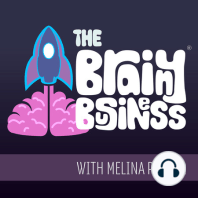47 min listen

111: Avoiding Everyday Work Disasters, an Interview with Dr. Gleb Tsipursky
FromThe Brainy Business | Understanding the Psychology of Why People Buy | Behavioral Economics
111: Avoiding Everyday Work Disasters, an Interview with Dr. Gleb Tsipursky
FromThe Brainy Business | Understanding the Psychology of Why People Buy | Behavioral Economics
ratings:
Length:
50 minutes
Released:
Jul 31, 2020
Format:
Podcast episode
Description
Today I am excited to introduce you to Dr. Gleb Tsipursky, a disaster avoidance expert and author of multiple books including Never Go With Your Gut, which we will be digging into today, as well as The Truth Seekers Handbook, and a brand new book called Resilience: Adapt and Plan for the New Abnormal of the COVID-19 Coronavirus Pandemic. Gleb has been consulting, coaching and speaking for over 20 years and has done work for clients like Aflac, Honda, IBM, the World Wildlife Fund, and over a hundred others. He taught at the Ohio State University and is a behavioral economist and cognitive neuroscientist studying the psychology of decision making in business. His research has appeared in Behavior and Social Issues, Journal of Social and Political Psychology and more. In our conversation today, Gleb will tell you about why you should never go with your gut, ways to think about avoiding disasters, what a disaster really is, and five important questions you should be asking to identify and avoid those potential disasters. I hope you enjoy the conversation and learn some valuable tips to apply into your life and business. Show Notes: [01:18] Gleb taught at Ohio State University and is a behavioral economist and cognitive neuroscientist studying the psychology of decision making in business. [02:46] Gleb will tell you about why you should never go with your gut, ways to think about avoiding disasters, and five important questions you should be asking in your business. [03:42] Gleb is known as the disaster avoidance expert. Disasters come from bad decisions. [05:06] In his research he looks at how we deal with these bad decisions in our professional and personal lives. [07:01] A disaster is anything that makes a significant negative impact on your bottom line. [09:01] Disasters can result from one big decision or a series of small decisions. [10:19] What are the alternatives to staying where you are and what are the long-term consequences of each action. [13:19] Our emotions determine 80-90% of our decision making when we don’t follow a structured decision making process. [14:14] We often feel emotionally attached and invested and don’t realize it will be better in the long run to let it go. You have to acknowledge you are wrong to address the situation. [16:45] Previously, the media filtered out some information, but now we have direct communication with public figures on the internet. [18:55] We believe the first thing we hear until it has been proven wrong. [19:10] Our gut reaction and intuitions are not wired for the modern world. [20:09] The anchoring bias is when we are anchored to the first piece of information we hear. It weighs on us more heavily. [22:19] The main reason we should not trust our gut is because it was created for the savannah environment and we don’t live in that environment anymore. [23:36] Herding is one way we show our tribal tendency. [25:44] There is tribal discomfort with someone that is clearly from another tribe. [26:43] An aspect of tribalism is called accent discrimination. [28:02] Tribalism can hurt morale and engagement and cause disasters. [29:59] We need to broaden our circle of empathy and who we consider to be part of our group or team. [30:09] Take an outside perspective. Step outside of yourself and look at your situation from an outside view. [31:17] Examples of aligning incentives so teams can work toward the same goal. [33:29] It is important to have globalized incentives that support the company overall. [34:44] There are more incentives that can be offered then just money. [37:36] The empathy gap has to do with us underestimating other people’s emotions—especially those who are not part of our tribe. [39:11] It is important to figure out what is going to be emotionally appealing to people and address their emotional needs in a way that aligns with the right incentives for the company. [40:04] Change management often results in a disaster because the focus i
Released:
Jul 31, 2020
Format:
Podcast episode
Titles in the series (100)
10. On Air Strategy Planning Session with Mariel Court: In this behavioral economics podcast it is time to apply what I have been talking about in the first 9 episodes through this very first on air strategy session, featuring my guest Mariel Court. Mariel is someone I met in the BizChix Coop (which is... by The Brainy Business | Understanding the Psychology of Why People Buy | Behavioral Economics